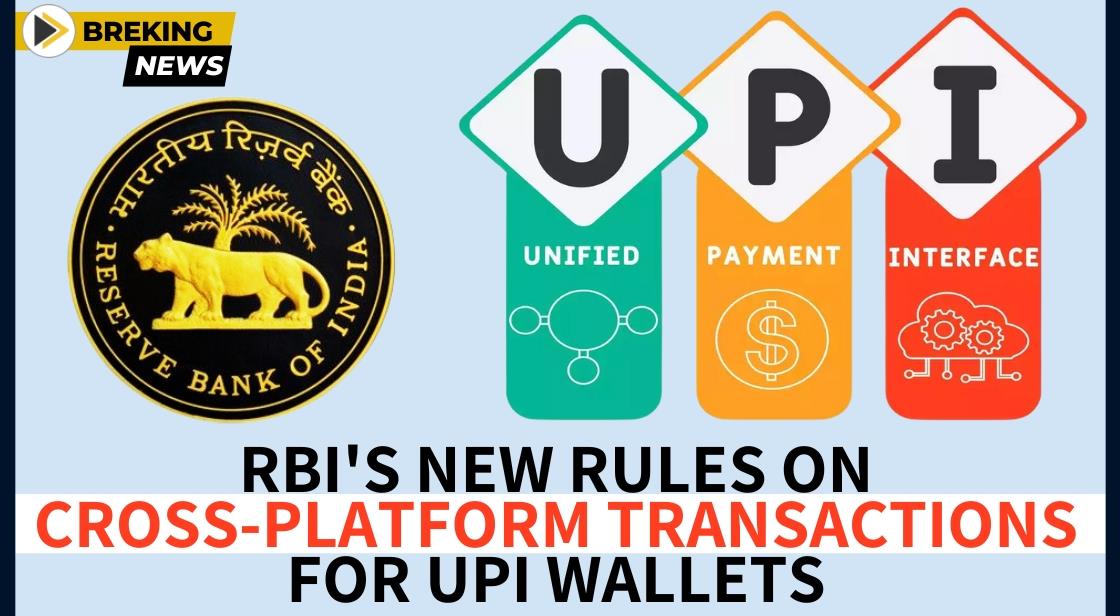RBI's New Rules on Cross-Platform Transactions for UPI Wallets

News Synopsis
The Reserve Bank of India (RBI) has taken a significant stride towards enhancing digital payment ecosystems with its recent announcement of new regulations governing prepaid payment instruments (PPIs). Under these pioneering regulations, users of prepaid payment instruments (PPIs) now have the liberty to conduct transactions seamlessly across any Unified Payments Interface (UPI) app, marking a monumental shift in the landscape of digital transactions in India.
Understanding Prepaid Payment Instruments (PPIs): Facilitating Cashless Transactions
Prepaid payment instruments (PPIs) serve as indispensable digital tools, empowering customers to store money and engage in cashless transactions effortlessly. These instruments encompass a diverse range of mediums, including wallets, cards, and vouchers, enabling users to make purchases, avail services, and transfer funds with utmost convenience and security. Governed by regulatory limits on value storage and usage, PPIs play a pivotal role in fostering financial inclusion and driving the transition towards a cashless economy.
RBI's Initiative to Enhance Flexibility: Empowering PPI Holders
Governor Shaktikanta Das of the RBI unveiled the groundbreaking proposal on April 5, underscoring the regulatory body's commitment to fostering innovation and inclusivity in the digital payments landscape. The new regulations pave the way for PPI holders to link their instruments through third-party UPI applications, thereby granting them unparalleled flexibility akin to bank account holders. This transformative initiative aims to democratize access to digital wallets and streamline transactions across platforms, heralding a new era of financial accessibility and convenience for millions of users.
Key characteristics of PPIs:
-
Cashless transactions: PPIs enable users to make digital payments for purchases, services, and fund transfers.
-
Regulatory limits: Unlike bank accounts, PPIs typically have limitations on the maximum amount of money that can be stored and used for transactions.
-
Facilitating digital payments: PPIs play a vital role in driving the growth of cashless transactions in India, offering a convenient and secure alternative to physical cash.
Implications of the Policy Change: Simplifying Cross-Platform Transactions
Shivaji Thapliyal, Head of Research at YES Securities, elucidated the far-reaching implications of the RBI's regulatory overhaul. With the implementation of these new rules, customers now possess the freedom to utilize any UPI app to access their preferred wallet, irrespective of the wallet provider or UPI app developer. This groundbreaking development eliminates the traditional constraints associated with PPI usage, empowering users to navigate seamlessly between platforms and leverage the full spectrum of digital payment solutions available at their disposal.
Unlocking Convenience: A Paradigm Shift in Digital Payments
The RBI's move to facilitate cross-platform transactions for UPI wallets represents a paradigm shift in the digital payments landscape, epitomizing the convergence of regulatory innovation and technological advancement. By dismantling barriers to interoperability and fostering a more inclusive and accessible financial ecosystem, these regulations pave the way for enhanced convenience, efficiency, and transparency in digital transactions, thereby propelling India towards its vision of a digitally empowered society.
Benefits of Cross-Platform UPI Wallet Transactions
The RBI's policy change brings several advantages to PPI users:
-
Enhanced User Experience: The ability to use preferred UPI apps for transactions with any linked PPI wallet provides greater flexibility and convenience.
-
Increased Competition: Opening up access to various UPI apps could potentially stimulate competition among wallet providers, potentially leading to better features and services for users.
-
Wider Adoption of Digital Payments: This move could encourage wider adoption of digital wallets by simplifying access and encouraging users to explore different UPI apps.
While the long-term impact of this policy remains to be seen, it represents a significant step towards a more user-friendly and interoperable digital payments ecosystem in India.
In conclusion, the RBI's visionary initiative holds the promise of revolutionizing the way Indians transact in the digital realm, unlocking unprecedented opportunities for financial empowerment and inclusion across the nation.
You May Like









